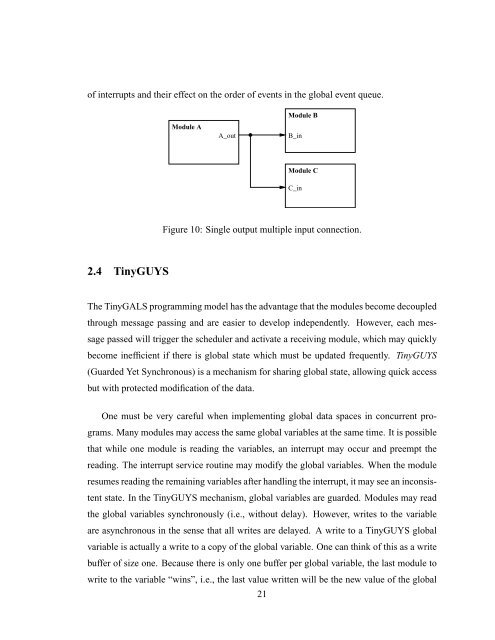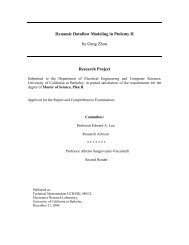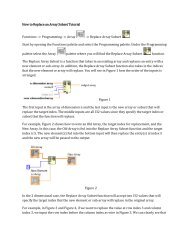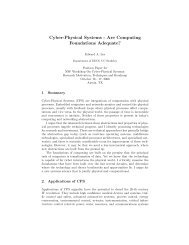Design and Implementation of TinyGALS: A Programming Model for ...
Design and Implementation of TinyGALS: A Programming Model for ...
Design and Implementation of TinyGALS: A Programming Model for ...
You also want an ePaper? Increase the reach of your titles
YUMPU automatically turns print PDFs into web optimized ePapers that Google loves.
<strong>of</strong> interrupts <strong>and</strong> their effect on the order <strong>of</strong> events in the global event queue.<br />
2.4 TinyGUYS<br />
Module A<br />
A_out<br />
Module B<br />
B_in<br />
Module C<br />
C_in<br />
Figure 10: Single output multiple input connection.<br />
The <strong>TinyGALS</strong> programming model has the advantage that the modules become decoupled<br />
through message passing <strong>and</strong> are easier to develop independently. However, each mes-<br />
sage passed will trigger the scheduler <strong>and</strong> activate a receiving module, which may quickly<br />
become inefficient if there is global state which must be updated frequently. TinyGUYS<br />
(Guarded Yet Synchronous) is a mechanism <strong>for</strong> sharing global state, allowing quick access<br />
but with protected modification <strong>of</strong> the data.<br />
One must be very careful when implementing global data spaces in concurrent pro-<br />
grams. Many modules may access the same global variables at the same time. It is possible<br />
that while one module is reading the variables, an interrupt may occur <strong>and</strong> preempt the<br />
reading. The interrupt service routine may modify the global variables. When the module<br />
resumes reading the remaining variables after h<strong>and</strong>ling the interrupt, it may see an inconsis-<br />
tent state. In the TinyGUYS mechanism, global variables are guarded. Modules may read<br />
the global variables synchronously (i.e., without delay). However, writes to the variable<br />
are asynchronous in the sense that all writes are delayed. A write to a TinyGUYS global<br />
variable is actually a write to a copy <strong>of</strong> the global variable. One can think <strong>of</strong> this as a write<br />
buffer <strong>of</strong> size one. Because there is only one buffer per global variable, the last module to<br />
write to the variable “wins”, i.e., the last value written will be the new value <strong>of</strong> the global<br />
21
















